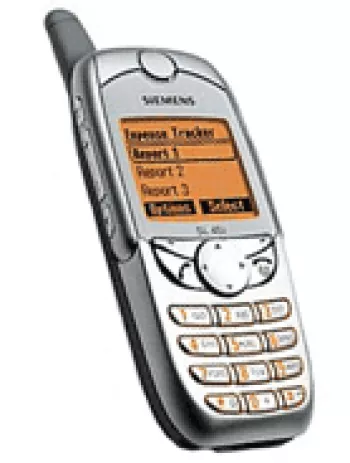
Overview of the Siemens AF51
The Siemens AF51, a feature phone introduced in 2005, stands as a notable example of early mobile technology innovation by Siemens. Though discontinued now, the AF51 serves as a testament to the once-thriving market for basic mobile phones, well before the dominance of modern smartphones. This article delves into the detailed specifications and features of the Siemens AF51.
Design and Build
The Siemens AF51 features a compact and sleek design, typical of early 2000s mobile phones. With dimensions of 79 x 41 x 19.6 mm and weighing only 80 grams, the device was highly portable, fitting comfortably in the palm of the hand or slipping easily into a pocket. It utilized a Mini-SIM card, a standard at that time, emphasizing the convenience of mobile communication.
Display Features
The phone housed a CSTN display capable of producing 65K colors. Although the screen size isn't specified, its resolution of 130 x 130 pixels provided basic visual clarity for functions that did not require high-definition graphics. The display's color capability was sufficient for simple graphics and user interface requirements typical in feature phones of that era.
Connectivity and Network
Supporting GSM technology, the Siemens AF51 was compatible with 2G bands (GSM 900, 1800, 1900), enabling broad global connectivity for calling and texting. The inclusion of GPRS Class 8 allowed for basic mobile internet use, although the absence of EDGE technology limited data speeds considerably. However, for users at the time, internet browsing was a secondary concern compared to the primary communication functions.
Performance and Battery Life
Equipped with a removable Li-Ion battery rated at 620 mAh, the AF51 was designed for extended periods of use without frequent charging. It offered up to 220 hours of standby time and up to 5 hours of talk time, making it reliable for everyday communication needs. The phone's efficient energy consumption was tailored to its simpler function set and was adequate for the average user profile during its release.
Memory and Storage
The Siemens AF51 did not offer expandable storage via a card slot, which was common in entry-level phones at the time. However, it featured a built-in phone book, supporting basic contact management. Call records were also maintained, keeping track of up to 10 dialed, 10 received, and 10 missed calls, which was a practical feature for managing mobile communication.
Audio and Sound
The device included a loudspeaker and supported polyphonic ringtones (32 tones). This feature allowed users to personalize their ringtones to some extent, which was a valued aspect of any mobile phone experience. The absence of a 3.5mm audio jack aligns with its basic design and feature set, focusing more on cellular communication than multimedia consumption.
Messaging and Browsing
Messaging capabilities included support for SMS and MMS, providing users with text and multimedia communication options. Although web browsing was limited, the inclusion of a WAP 1.2.1 browser allowed for basic access to lightweight web pages, facilitating minimal mobile internet interaction.
Software and Additional Features
Running on a proprietary feature phone operating system, the Siemens AF51 was equipped with Java MIDP 1.0, enabling some level of customization through downloadable games. This functionality offered an early glimpse into mobile entertainment offerings, providing users with simple gaming experiences. The features included alert types like vibration and downloadable games, enhancing user engagement with the device.
Launch and Market Impact
Announced in November 2005, the Siemens AF51 was eventually discontinued, as the market shifted increasingly toward smartphones and more advanced mobile technology. Despite its eventual phase-out, it remained an example of the transitional phase in mobile communication, illustrating the bridge between basic feature phones and the advanced connectivity-centric devices of today.
Final Thoughts
The Siemens AF51 encapsulates an important moment in the evolution of mobile technology. For users looking back or collectors interested in mobile phone history, the AF51 remains a valuable piece of technological nostalgia. Its simplicity, operational durability, and historical relevance make it a representative model of early mobile communication technology, providing insights into the user needs and technological limitations of its time.
Key Features of Siemens AF51
- Compact size with dimensions of 79 x 41 x 19.6 mm, making it easy to carry.
- Lightweight, weighing only 80 g for comfortable handling.
- GSM technology supported on 900/1800/1900 bands for basic connectivity.
- Colorful CSTN, 65K colors display with 130 x 130 pixels resolution.
- Basic messaging support with SMS and MMS capabilities.
- Polyphonic (32) ringtones along with vibration alert options.
- Java support with MIDP 1.0 for running basic applications and games.
- Battery life offering up to 220 hours of standby time and up to 5 hours of talk time.
- Available in two color options: Panther Black and Dolphin Grey.
Disadvantages of Siemens AF51
- No EDGE support.
- Discontinued model, no longer in production.
- No memory card slot for expandable storage.
- No camera feature available.
- No 3.5mm headphone jack.
- No WLAN support.
- No Bluetooth connectivity.
- No GPS positioning feature.
- No Radio functionality.
- Limited resolution and color depth on display (65K colors).
- Basic WAP 1.2.1 browser, limited web capabilities.
- Low battery capacity with only 620 mAh.

View Also
More Phones
All Rights Reserved +14266 Phones © Mobilawy 2025

























